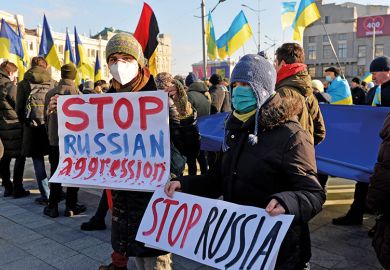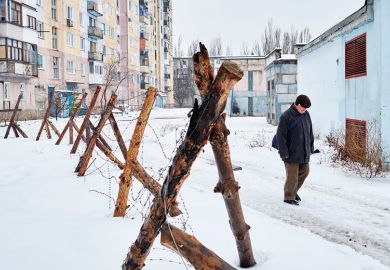Germany has said that all collaboration with Russia on education and research is being “halted immediately”, amid growing condemnation of its invasion of Ukraine.
The German Ministry of Education and Research said that the Russian attack was “a grave breach of international law with no justification whatsoever. There must be serious consequences.
“By its action, Russia has turned its back on the international community. For [Germany], this means that the existing, long-standing cooperation in science and research as well as in vocational education and training is being halted immediately, even though this cooperation is fundamentally in the interests of both sides and contributes to the solution of global challenges such as climate change,” the ministry said.
“All current and planned activities with Russia are being frozen and subjected to critical review. There will be no new activities until further notice.”
The ruling means that German universities will freeze all research projects and other relations with their Russian counterparts.
Before the ministry’s announcement, the German Rectors’ Conference (HRK) had described Russia’s invasion of Ukraine as “deeply distressing”.
“We are very concerned about the lives and the well-being of Ukrainian academics and students. German universities will assist them within the scope of their capabilities,” said Peter-André Alt, the HRK’s president.
“It is also foreseeable that these developments will cause serious damage to German-Russian academic relations. We will have to examine the relevant consequences in detail.”
Many other universities and academic associations in Europe and beyond have expressed solidarity with Ukraine. Speaking to Times Higher Education as the invasion began, Serhiy Kvit, head of Ukraine’s higher education quality assurance agency and newly elected rector of the National University of Kyiv-Mohyla Academy (NaUKMA), appealed to scholars and institutions overseas to support his country and “stand up with Ukraine against [Vladimir] Putin’s regime”.
He called on universities and academic institutions in Europe and around the world to make their voices heard and petition their governments to act.
“You, our academic colleagues worldwide, can [and] should be heard with your clear and loud message of support to Ukraine,” said Professor Kvit, a former Ukrainian education minister.
Register to continue
Why register?
- Registration is free and only takes a moment
- Once registered, you can read 3 articles a month
- Sign up for our newsletter
Subscribe
Or subscribe for unlimited access to:
- Unlimited access to news, views, insights & reviews
- Digital editions
- Digital access to THE’s university and college rankings analysis
Already registered or a current subscriber?








